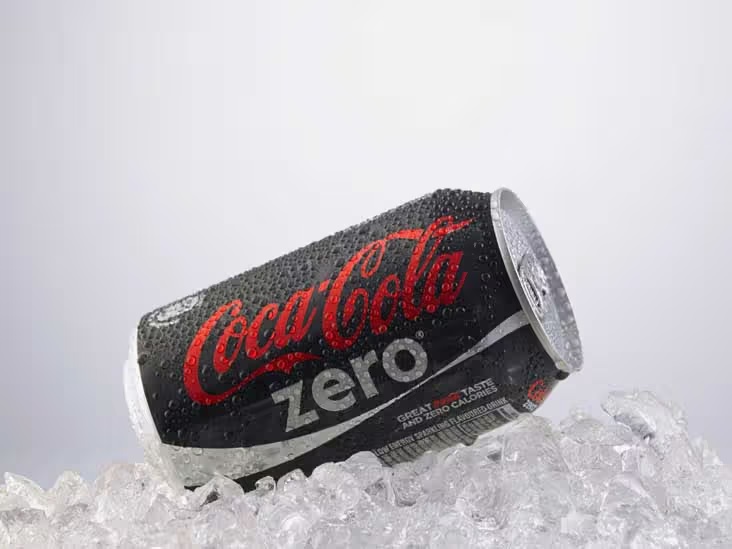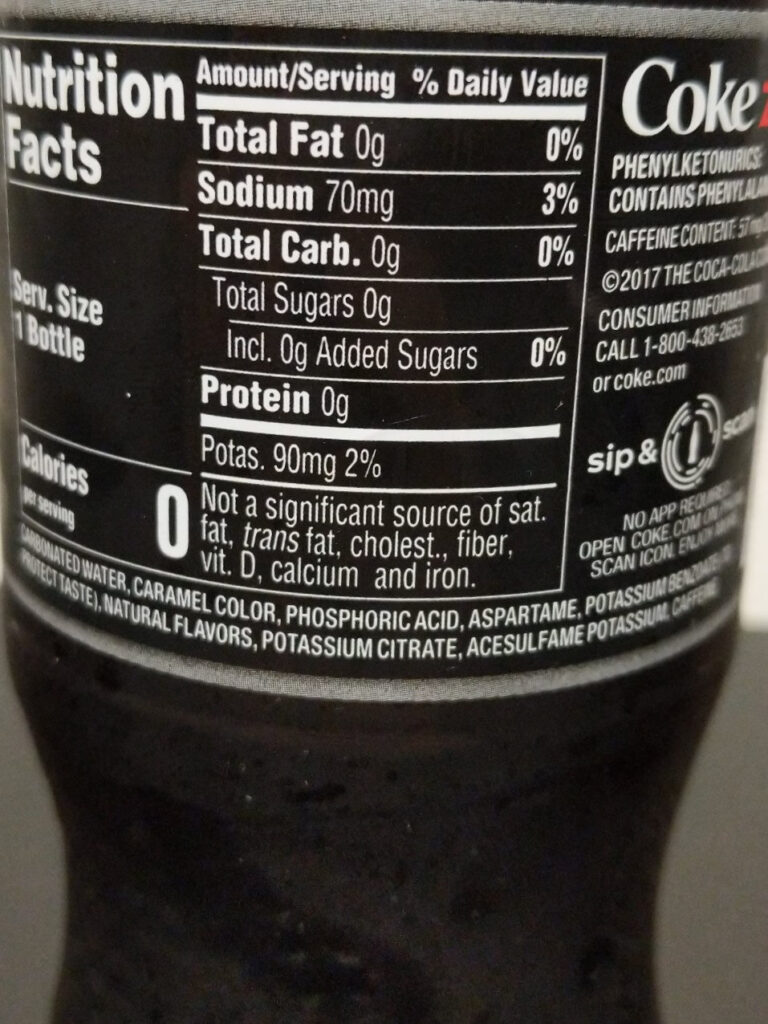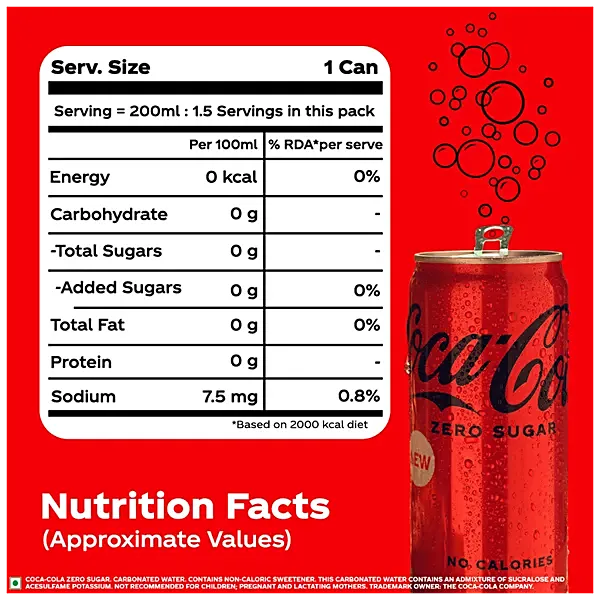Coke Zero, a sugar-free variant of Coca-Cola, has gained popularity among those seeking the classic taste of cola without the caloric content. Understanding the Coke Zero nutrition facts is essential for individuals making informed dietary choices. In this comprehensive exploration, we break down the key components and values that make up the nutrition profile of Coke Zero in order to provide you a detailed overview of Coke Zero nutrition facts. Without further wasting time, let’s dive deep into this.
Also Read: Coke Zero Vs Diet Coke: Know The Real Differences!

Serving Size and Calories
The standard serving size for Coke Zero is typically listed as one can, containing 12 fluid ounces (355 milliliters). Coke Zero is celebrated for its zero-calorie content, making it an appealing choice for those aiming to manage weight or reduce overall caloric intake.
Total Fat
Coke Zero contains negligible amounts of total fat, and the fat content is typically listed as 0 grams per serving. The absence of fat contributes to the beverage’s low-calorie profile, aligning with its sugar-free formulation.

Sodium
Sodium content is one of the most crucial Coke Zero nutrition facts. Sodium content is listed in milligrams per serving. Coke Zero typically contains a small amount of sodium, ranging from 25 to 40 milligrams per serving. The low sodium content makes Coke Zero a suitable option for individuals aiming to moderate their salt intake, although it remains a minor component of the overall nutrition profile.
Total Carbohydrates
The total carbohydrate content is listed in grams per serving. Coke Zero typically contains 0 grams of carbohydrates. The absence of carbohydrates is a key feature, especially for those following low-carbohydrate diets or looking to minimize sugar intake.
Dietary Fiber
Coke Zero is not a source of dietary fiber, and the fiber content is typically listed as 0 grams per serving. While dietary fiber is essential for digestive health, it is not expected in carbonated beverages like Coke Zero.
Total Sugars
One of the defining Coke Zero nutrition facts is that Coke Zero is technically sugar-free. The total sugar content is listed as 0 grams per serving. The absence of sugars makes Coke Zero a preferred choice for individuals looking to reduce their sugar consumption without compromising on flavor.
Protein
Coke Zero is not a significant source of protein, and the protein content is typically listed as 0 grams per serving. Beverages like Coke Zero are not intended to contribute substantially to protein intake, and individuals should rely on other food sources for meeting their protein needs.
Don’t Miss: Is Coke Zero Bad for You? Know The Truth Here!
Additional Coke Zero Ingredients

Carbonated Water
The foundation of Coke Zero, carbonated water provides the effervescence and bubbles characteristic of carbonated sodas. It is the primary liquid base that carries the other ingredients.
Caramel Color
Added for visual appeal, caramel color gives Coke Zero its classic dark brown hue. This coloring agent is commonly used in the food and beverage industry to enhance the appearance of products.
Phosphoric Acid
Contributing to the tangy flavor profile, phosphoric acid is a common ingredient in colas. It enhances the overall taste of the beverage, providing a balance to the sweetness and contributing to the signature cola flavor.
Aspartame
Aspartame is an artificial sweetener used in Coke Zero to provide sweetness without adding calories. It is a combination aspartic acid, and phenylalanine – both these two are amino acids. Aspartame is several hundred times sweeter than sucrose (table sugar), allowing for the desired sweetness without the caloric content.
Acesulfame Potassium
Another artificial sweetener, acesulfame potassium is often used in combination with aspartame to enhance the overall sweetness of Coke Zero. Like aspartame, it is a calorie-free sweetener that contributes to the sugar-free formulation.
Potassium Benzoate (Preservative)
Potassium benzoate serves as a preservative, helping to extend the shelf life of Coke Zero. It inhibits the growth of microorganisms, maintaining the beverage’s quality over time.
Natural Flavors
The term “natural flavors” is a broad category encompassing various extracts, essential oils, or compounds derived from natural sources. In Coke Zero, natural flavors are added to replicate the taste of traditional Coca-Cola. The specific combination and ratio of flavors are proprietary to The Coca-Cola Company.
Caffeine Content
Since many people are concerned with the caffeine content in Coke Zero, this makes it one of the crucial Coke Zero nutrition facts. Coke Zero contains caffeine, with the caffeine content typically listed as around 34 milligrams per 12-ounce serving. The caffeine in Coke Zero contributes to its stimulating effects, providing a mild energy boost.
Conclusion: Making Informed Choices
Understanding the Coke Zero nutrition facts is essential for individuals seeking a sugar-free cola experience. With its zero-calorie content, absence of sugars, and carefully selected artificial sweeteners, Coke Zero aligns with the preferences of those looking to manage weight, reduce sugar intake, or enjoy a sugar-free alternative to traditional sodas.
As with any beverage, moderation is key, and individuals with specific health concerns or dietary restrictions should review the nutrition label and consult with healthcare professionals if necessary. By being aware of the ingredients and values, consumers can make informed choices that align with their health and wellness goals. Hopefully, you found this article on Coke Zero nutrition facts helpful enough. If you really did let us know your unfiltered thoughts about it in the comment section down below. Thanks for visiting and appreciating our work.
